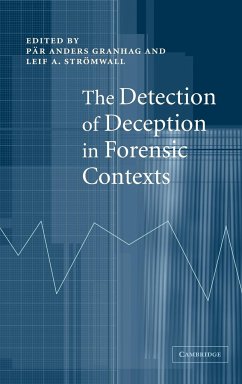Short description/annotation
Cutting edge account of the field of deception detection ideal for academics, students and professionals.
Main description
One of the most fascinating sub-divisions within the rapidly growing field of psychology and law is the area of deception detection. Traditionally this area has been characterised by a number of approaches which have analysed different aspects of deception such as verbal content, non-verbal behaviour, and polygraph testing. The last few years' intensive research has resulted in an impressive corpus of new knowledge about issues such as cross-cultural deception, the detection of simulated amnesia and false confessions, lie-catching expertise and how best to train professionals in detecting deception. This book provides a state-of-the-art account of current research and practice, written by an international team of experts and will be a valuable resource for academics, students, practitioners and all professionals within the legal domain who need to tackle questions of credibility and reliability.
Table of contents:
Part I. Introduction; 1. Research on deception detection: past and present P. A. Granhag and L. A. Strömwall; Part II. Lie-Detection Techniques: 2. Discerning lies from truths: behavioural cues to deception and the indirect pathways of intuition B. M. DePaulo and W. L. Morris; 3. Statement validity analysis and the detection of the truth G. Köhnken; 4. Reality monitoring and detection of deception S. L. Sporer; 5. The psychophysiological detection of deception C. R. Honts; Part III. Special Problems Facing a Lie-Catcher: 6. Lies travel: mendacity in a mobile world C. F. Bond and S. R. Rao; 7. Coping with suggestion and deception in children's accounts G. Davies; 8. The detection of false confessions S. Kassin; 9. Crime-related amnesia as a form of deception S. Å. Christianson and H. Merckelbach; Part IV. Enhancing Lie-Detection Accuracy: 10. Practitioners' beliefs about deception L. A. Strömwall, P. A. Granhag and M. Hartwig; 11. Training to detect deception from behavioural cues: attempts and problems R. Bull; 12. The wizards of deception detection M. O'Sullivan and P. Ekman; 13. Guidelines to catch a liar A Vrij; Part V. Conclusions: 14. Research on deception detection: future challenges P. A. Granhag and L. A. Strömwall.
Cutting edge account of the field of deception detection ideal for academics, students and professionals.
Main description
One of the most fascinating sub-divisions within the rapidly growing field of psychology and law is the area of deception detection. Traditionally this area has been characterised by a number of approaches which have analysed different aspects of deception such as verbal content, non-verbal behaviour, and polygraph testing. The last few years' intensive research has resulted in an impressive corpus of new knowledge about issues such as cross-cultural deception, the detection of simulated amnesia and false confessions, lie-catching expertise and how best to train professionals in detecting deception. This book provides a state-of-the-art account of current research and practice, written by an international team of experts and will be a valuable resource for academics, students, practitioners and all professionals within the legal domain who need to tackle questions of credibility and reliability.
Table of contents:
Part I. Introduction; 1. Research on deception detection: past and present P. A. Granhag and L. A. Strömwall; Part II. Lie-Detection Techniques: 2. Discerning lies from truths: behavioural cues to deception and the indirect pathways of intuition B. M. DePaulo and W. L. Morris; 3. Statement validity analysis and the detection of the truth G. Köhnken; 4. Reality monitoring and detection of deception S. L. Sporer; 5. The psychophysiological detection of deception C. R. Honts; Part III. Special Problems Facing a Lie-Catcher: 6. Lies travel: mendacity in a mobile world C. F. Bond and S. R. Rao; 7. Coping with suggestion and deception in children's accounts G. Davies; 8. The detection of false confessions S. Kassin; 9. Crime-related amnesia as a form of deception S. Å. Christianson and H. Merckelbach; Part IV. Enhancing Lie-Detection Accuracy: 10. Practitioners' beliefs about deception L. A. Strömwall, P. A. Granhag and M. Hartwig; 11. Training to detect deception from behavioural cues: attempts and problems R. Bull; 12. The wizards of deception detection M. O'Sullivan and P. Ekman; 13. Guidelines to catch a liar A Vrij; Part V. Conclusions: 14. Research on deception detection: future challenges P. A. Granhag and L. A. Strömwall.


